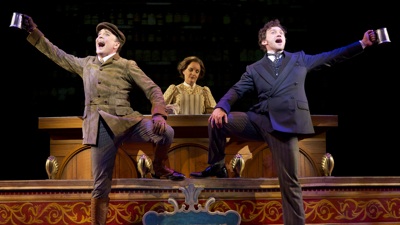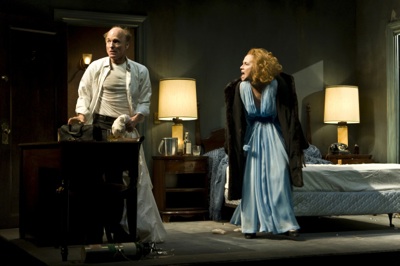 Star turns on and Off Broadway have enlivened our stages in New York. Whether you’re visiting town (these are torrid weeks at the boxoffice) or in town (winter is a great time of the year to see a show once the tourists have left) here are a few actors worth savoring.
Star turns on and Off Broadway have enlivened our stages in New York. Whether you’re visiting town (these are torrid weeks at the boxoffice) or in town (winter is a great time of the year to see a show once the tourists have left) here are a few actors worth savoring.
Adriane Lenox, After Midnight. In a musicals-challenged season to date, this Cotton Club revue has been enthusiastically received. I loved the dancing (that Nicholas Brothers style always thrills me) and the band, hand-picked by Wynton Marsalis, but host Dule Hill and headliner Fantasia Barrino are competent without being terribly exciting. So it’s up to the Tony-winning Lenox, a great singer as well as a great actress, to raise the roof, which she does with two numbers, “Women Be Wise” and “Go Back Where You Stayed Last Night.” After Midnight gives you what you want; Lenox leaves you wanting more.
Tracee Chimo, Bad Jews. Just one more week to be startled by her ferocious and funny performance as a Manhattanite who wears her Jewishness like a suit of armor, fighting her less observant family tooth and claw for her grandfather’s Chai necklace.
 Rafe Spall, Betrayal. An excellent, comedy-inflected performance, not that there’s much comedy to be had in Harold Pinter’s straightforward account of a love affair told backwards, from the end to the beginning. Or, at least, not typically; the director, Mike Nichols, is determined, overly so, to lighten the load, and the job falls to Spall, excavating laughs where they’re usually aren’t any. It’s a tactic, though the much-touted revival is still a letdown, as was the 2000 Broadway staging with Liev Schreiber, Juliette Binoche, and John Slattery. Not easy to get right–has the play been made redundant by its riveting (and elusive) 1983 film version? Daniel Craig and Rachel Weisz are more tightly leashed as the husband and wife in a theatrical “event” that misfires.
Rafe Spall, Betrayal. An excellent, comedy-inflected performance, not that there’s much comedy to be had in Harold Pinter’s straightforward account of a love affair told backwards, from the end to the beginning. Or, at least, not typically; the director, Mike Nichols, is determined, overly so, to lighten the load, and the job falls to Spall, excavating laughs where they’re usually aren’t any. It’s a tactic, though the much-touted revival is still a letdown, as was the 2000 Broadway staging with Liev Schreiber, Juliette Binoche, and John Slattery. Not easy to get right–has the play been made redundant by its riveting (and elusive) 1983 film version? Daniel Craig and Rachel Weisz are more tightly leashed as the husband and wife in a theatrical “event” that misfires.
Jeff Goldblum and Laurie Metcalf, Domesticated. In the new play by Bruce Norris, of the award-winning Clybourne Park, he’s a New York gynecologist-turned-politician whose career has cracked up after a prostitution scandal; she’s his wife, who spends the first act busily doing damage control on all fronts while he sits and listens, with his back to us. In the second act it’s his turn to vent his spleen at misfortunes he blames on our hangups and hypocrisy regarding sex, which gets him into more trouble. More position paper than play, the production rests mostly on the shoulders of these formidable performers, who bring comic bite and a touch of pathos to Norris’ provocations.
Michael Cerveris, Fun Home. The Public has extended this musical adaptation of Alison Bechdel’s much-acclaimed graphic novel several times. Moving it uptown is a tricky proposition: the musical, which contrasts the homosexual awakening of Bechdel with the painful shutdown of the same desire by her father, a funeral parlor director and furniture restorer, appeals to critics and an Off Broadway audience, and would likely sweep the Tonys in an off year for the form on Broadway. A broader audience, however, would likely steer clear, as it did for another worthy Jeanine Tesori musical, the civil rights-themed Caroline, or Change, which premiered in the same Public space a decade ago. I’m on the fence: There’s some stirring material in its 100 minutes, but also a repetition of theme and tone (a problem I had with Caroline), and an overall chill to the father’s misdeeds (downplayed in this adaptation) and fate. You want to get up there and shake some sense into everyone. This problem, however, is not the fault of the cast, including Judy Kuhn as Bechdel’s walking-wounded mother and the faultless Cerveris as the saddest of dads–he brings us as close to him as the material allows.
 Bryce Pinkham and Jefferson Mays, A Gentleman’s Guide to Love & Murder. The one fully satisfying Broadway musical this season is inspired by the classic British comedy Kind Hearts and Coronets (1949), which featured Alec Guinness in multiple roles as various dreadful heirs to a fortune bumped off by another relative leapfrogging from rags to riches. In the Guinness part(s) is the great Mays, a Tony winner (for the cross-dressed I Am My Own Wife) who goes from one mirthful characterization to another in the blink of a costume change. The episodic nature of the piece is ideal for plugging in songs, and there are many good ones, by Robert L. Freedman and Steven Lutvak, which suggest a music hall How to Succeed in Business Without Really Trying inflected with Sweeney Todd. It wouldn’t hold together, however, without a strong lead climbing the ladder of success by sawing off all the interfering rungs, and it has one in Pinkham, a survivor of Ghost the Musical who emerges a full-out Broadway star in this delightful show. Highest recommendation.
Bryce Pinkham and Jefferson Mays, A Gentleman’s Guide to Love & Murder. The one fully satisfying Broadway musical this season is inspired by the classic British comedy Kind Hearts and Coronets (1949), which featured Alec Guinness in multiple roles as various dreadful heirs to a fortune bumped off by another relative leapfrogging from rags to riches. In the Guinness part(s) is the great Mays, a Tony winner (for the cross-dressed I Am My Own Wife) who goes from one mirthful characterization to another in the blink of a costume change. The episodic nature of the piece is ideal for plugging in songs, and there are many good ones, by Robert L. Freedman and Steven Lutvak, which suggest a music hall How to Succeed in Business Without Really Trying inflected with Sweeney Todd. It wouldn’t hold together, however, without a strong lead climbing the ladder of success by sawing off all the interfering rungs, and it has one in Pinkham, a survivor of Ghost the Musical who emerges a full-out Broadway star in this delightful show. Highest recommendation.
Cherry Jones and Zachary Quinto, The Glass Menagerie. “This is a Glass Menagerie for people who don’t like The Glass Menagerie, like me,” said my wife, on whom something of the critic has rubbed off. And she’s right–not for this production the usual delicacies applied to Tennessee Williams’ first classic (a favorite of mine, anyway). Jones and Quinto barnstorm their way through it, with the former playing Amanda as a determined, no-nonsense single mother, and the latter’s Tom steeped in his dreams and resentments. The battle-of-wills treatment isn’t all to my liking, but that’s what interpretation is all about, and this revival has proved a big success. Have at it.
 Ed Harris, The Jacksonian. Playwright Beth Henley has never been able to replicate the popularity of her first hit, Crimes of the Heart. She doesn’t even try with this Southern Gothic, which is laced with the blood and thunder that Martin McDonagh and Tracy Letts bring to their work. As a faded dentist stuck in the hotel of the title (it’s Mississippi amidst the civil rights outrages of the 60s, and he’s only dubiously employed, with family troubles), Harris gives a customarily spit-and-polish performance that grows considerably more demented. Joining Harris in what must have been a labor of love (it’s an intriguing if not entirely successful stab at something different for Henley) are Amy Madigan, Bill Pullman, and Glenne Headly, who also appeared in the original Los Angeles production. Closes Sunday.
Ed Harris, The Jacksonian. Playwright Beth Henley has never been able to replicate the popularity of her first hit, Crimes of the Heart. She doesn’t even try with this Southern Gothic, which is laced with the blood and thunder that Martin McDonagh and Tracy Letts bring to their work. As a faded dentist stuck in the hotel of the title (it’s Mississippi amidst the civil rights outrages of the 60s, and he’s only dubiously employed, with family troubles), Harris gives a customarily spit-and-polish performance that grows considerably more demented. Joining Harris in what must have been a labor of love (it’s an intriguing if not entirely successful stab at something different for Henley) are Amy Madigan, Bill Pullman, and Glenne Headly, who also appeared in the original Los Angeles production. Closes Sunday.
Julie Taymor, A Midsummer Night’s Dream. She’s baaaaccckkkk! The director behind the epic fail of Spider-Man Turn Off the Dark, which fades to black soon (as the show releases YouTube clips of participants performing dramatic readings from a tell-all book) returns on firmer ground to an old home, Theatre for a New Audience, which has a lovely new black box space just minutes from where I live in Brooklyn. This inaugural production gives her full creative rein, and I saw her at a preview, busily attending to this and that detail of a lively show heavy on (inexpensive) stage magic. No matter what a snarky Law & Order episode had to say about it, Spider-Man wasn’t altogether her fault (anything of outstanding visual interest in it came from her), and it’s good to have her back with the Bard.
Ian McKellen and Patrick Stewart, No Man’s Land. What’s the best moment of the theatre season to date? Surely when McKellen, in a verbal joust with Stewart over old loves in Harold Pinter’s cryptic comedy about grumpy old authors, announces that Stewart’s went to bed with him, but stopped before intercourse–“she consumed my cock,” he says, as the audience rocks with laughter. The remaining audience, that is–there were walkouts during the intermission (Betrayal doesn’t have one). Credit these old pros for choosing two difficult plays to perform in repertory (Waiting for Godot is the other) and doing so immaculately, with pinpoint physical grace and verbal dexterity. Also, kudos to Stewart’s hairpiece designer.
 Mark Rylance, Twelfth Night. As Olivia in Shakespeare’s comedy, Rylance may very well add a third Tony to his collection, alongside those for Boeing-Boeing and Jerusalem–this time as best actress. Performed in repertory with Richard III, this is the most lucid, and lyrical, production of a play that lends itself all too easily to design gimmicks that I’ve ever seen. Thanks to Rylance, and a splendid cast that includes Stephen Fry and a scene-swiping Paul Chahidi (all the female roles are played by women, as in the Elizabethan era), we’re transported back in time…and reminded that theatre can move us as no other form.
Mark Rylance, Twelfth Night. As Olivia in Shakespeare’s comedy, Rylance may very well add a third Tony to his collection, alongside those for Boeing-Boeing and Jerusalem–this time as best actress. Performed in repertory with Richard III, this is the most lucid, and lyrical, production of a play that lends itself all too easily to design gimmicks that I’ve ever seen. Thanks to Rylance, and a splendid cast that includes Stephen Fry and a scene-swiping Paul Chahidi (all the female roles are played by women, as in the Elizabethan era), we’re transported back in time…and reminded that theatre can move us as no other form.





Comments